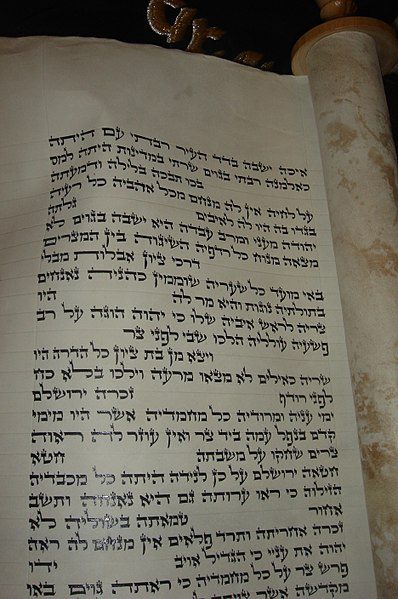Previously, we asked of Jeremiah’s lament for Jerusalem, “For what hope have any who have turned against the Lord?” He has just said, “For my groans are many, and I am sick at heart. – Lamentations 1:22b And now his elegy will address a just judgment on Jerusalem by the Lord.
Judgment on Jerusalem
Lamentations 2
אֵיכָה֩ יָעִ֨יב בְּאַפּ֤וֹ׀ אֲדֹנָי֙ אֶת־בַּת־צִיּ֔וֹן הִשְׁלִ֤יךְ מִשָּׁמַ֙יִם֙ אֶ֔רֶץ תִּפְאֶ֖רֶת יִשְׂרָאֵ֑ל וְלֹא־זָכַ֥ר הֲדֹם־רַגְלָ֖יו בְּי֥וֹם אַפּֽוֹ׃ ס
איכה 2 The Westminster Leningrad Codex (WLC)
The Lord [אֲדֹנָי ‘Adonay] has overshadowed Daughter Zion with his anger!
How hath the Lord covered the daughter of Zion
Lamentations 2:3 AKJV
with a cloud in his anger,
and cast down from heaven unto the earth
the beauty of Israel,
and remembered not his footstool
in the day of his anger!
His daughter is Zion, Jerusalem, ‘the parched place.’ She receives the cloud of His anger over her beauty, as if she had never dwelled in the Light of His heavenly Throne as His beloved footstool. She no longer worships Him!
2 … In his wrath he has demolished the fortified cities of Daughter Judah…
Judgment on all of Judah
And now another beloved daughter. So the Lord punishes not only Jerusalem but all of Judah. He cut off ‘all the horn of Israel,’ its strength and its rays of light on the high places.
ה He
5 The Lord is like an enemy;
he has swallowed up Israel.
He swallowed up all its palaces
and destroyed its fortified cities.
He has multiplied mourning and lamentation
within Daughter Judah.
ו Waw
6 He has wrecked his temple
as if it were merely a shack in a field,
destroying his place of meeting.
The Lord has abolished
appointed festivals and Sabbaths in Zion.
He has despised king and priest
in his fierce anger.
ז Zayin
7 The Lord has rejected his altar,
repudiated his sanctuary;
he has handed the walls of her palaces
over to the enemy.
Can you imagine this happening to our nation, our religious and political leaders and to the security of our homes and families today?
Jeremiah describes the dismay of their leaders.
י Yod
10 The elders of Daughter Zion
sit on the ground in silence.
They have thrown dust on their heads
and put on sackcloth….
Then Jeremiah points back to their former sin of hearing false prophets who predict with deceptive visions and do not mention our iniquities. Yet he laments, “Who can heal you?” So this is his intercession on their behalf.
Hope through God’s Mercy
I am the man who has seen affliction
Lamentations 3:1-2
under the rod of God’s wrath.
He has driven me away and forced me to walk
in darkness instead of light.
Jeremiah recalls his own suffering when leaders of Jerusalem and all of Judah and Israel refused to listen to the Lord’s warnings spoken by him. And he asks for God’s mercy.
19 Remember my affliction and my homelessness,
the wormwood and the poison.
Then he prays: “The Lord is my portion, therefore I will put my hope in him.” He then encourages others to hope in the Lord, even in their distress.
Waiting for Judgment
ט Teth
25 The Lord is good to those who wait for him,
to the person who seeks him.
26 It is good to wait quietly
for salvation from the Lord.
Can you wait for the Lord in your suffering?
Sin so often destroys us – the sin of others and our own sin. Do you listen to the rebukes of the Lord before your fall?
Listen to some of Jeremiah’s encouragement, even in this lament.
28 Let him sit alone and be silent, for God has disciplined him. 30 … let him be filled with disgrace.
How we take an attitude against the Lord and against any who suggest that who ought to endure deserved scorn and reproach.
We refuse to be shamed for punishment we rightfully deserve. Yet He will judge – He will judge if we protest our rebuke and He will judge even when we sit silently hoping in our Redeemer. May the Lord have mercy on us.
Unless the Lord has ordained it
מ Mem
37 Who is there who speaks and it happens,
unless the Lord has ordained it?
38 Do not both adversity and good
come from the mouth of the Most High?
39 Why should any living person complain,
any man, because of the punishment for his sins?
Jeremiah’s question to fallen Israel could well apply to one fallen in our own sin today.
So sit alone, be silent and consider the Lord’s discipline.
Even we do not willingly allow our deserved shame and disgrace. Neither will we sorrowfully thank Christ for carrying our reproach to the Cross.
I called on your name, Lord,
Lamentations 3:55-56 CSB
from the depths of the pit.
You heard my plea:
Do not ignore my cry for relief.
59 Lord, you saw the wrong done to me; judge my case.
Can you ask judgment (without Christ’s grace), as Jeremiah plead?
66 You will pursue them in anger and destroy them under your heavens.
Will the Lord also pursue you in your sins and iniquity, overshadowing all hope of deliverance from death?
O, contemporary christian, how like those who would not listen to Jeremiah are we, when turning from the Lord.
To be continued...





